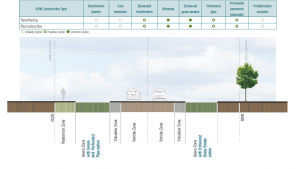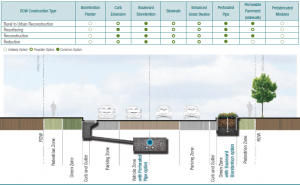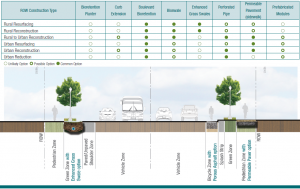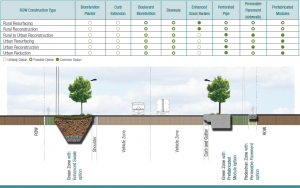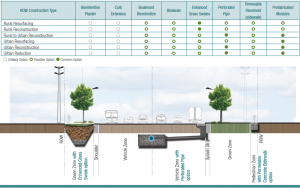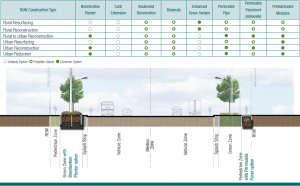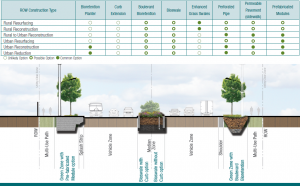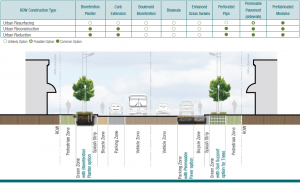Difference between revisions of "LID opportunities in road-right-of-ways"
Jenny Hill (talk | contribs) |
|||
| (15 intermediate revisions by 2 users not shown) | |||
| Line 1: | Line 1: | ||
| − | + | Rights of way (RoW) standards in Ontario vary by municipality, but generally there are seven typical ROW types: | |
| − | Rights of way ( | ||
{{TOClimit|2}} | {{TOClimit|2}} | ||
This article discusses the characteristics, opportunities, constraints, and examples for each of these road types. This guidance is not intended to be prohibitive of other LID options, but rather to help reduce the number of LID options in the preliminary phases of screening and to alert the designer to LID opportunities unique to each road type. Adjacent land uses, traffic demands, utility locations, budget constraints and geological conditions will determine the most appropriate LID solution. | This article discusses the characteristics, opportunities, constraints, and examples for each of these road types. This guidance is not intended to be prohibitive of other LID options, but rather to help reduce the number of LID options in the preliminary phases of screening and to alert the designer to LID opportunities unique to each road type. Adjacent land uses, traffic demands, utility locations, budget constraints and geological conditions will determine the most appropriate LID solution. | ||
| Line 16: | Line 15: | ||
|+ LID options for rural residential road (rural cross section)<br> | |+ LID options for rural residential road (rural cross section)<br> | ||
(** = Common, * = Possible, o = Unusual) | (** = Common, * = Possible, o = Unusual) | ||
| − | ! | + | ! RoW Construction Type |
! [[Stormwater planters]] | ! [[Stormwater planters]] | ||
! [[Curb extensions]] | ! [[Curb extensions]] | ||
| Line 23: | Line 22: | ||
! [[Enhanced swales]] | ! [[Enhanced swales]] | ||
! [[Exfiltration trenches]] | ! [[Exfiltration trenches]] | ||
| − | ! [[Permeable | + | ! [[Permeable pavements]] |
! Prefabricated modules | ! Prefabricated modules | ||
|- | |- | ||
| Line 38: | Line 37: | ||
|- | |- | ||
| | | | ||
| − | *Use of [[permeable | + | *Use of [[permeable pavements]] within the roadway is not economical when there are adjacent [[swales]] to filter and infiltrate runoff |
| | | | ||
*[[Bioswales]] or the use of [[perforated pipes]] beneath grass swales can reduce the nuisance problems associated with conventional swales like standing surface water and steep slopes | *[[Bioswales]] or the use of [[perforated pipes]] beneath grass swales can reduce the nuisance problems associated with conventional swales like standing surface water and steep slopes | ||
| Line 54: | Line 53: | ||
|+ LID options for local residential road (urban cross section) <br> | |+ LID options for local residential road (urban cross section) <br> | ||
(** = Common, * = Possible, o = Unusual) | (** = Common, * = Possible, o = Unusual) | ||
| − | ! | + | ! RoW Construction Type |
! [[Stormwater planters]] | ! [[Stormwater planters]] | ||
! [[Curb extensions]] | ! [[Curb extensions]] | ||
| Line 61: | Line 60: | ||
! [[Enhanced swales]] | ! [[Enhanced swales]] | ||
! [[Exfiltration trenches]] | ! [[Exfiltration trenches]] | ||
| − | ! [[Permeable | + | ! [[Permeable pavements]] (sidewalk) |
! Prefabricated modules | ! Prefabricated modules | ||
|- | |- | ||
| Line 98: | Line 97: | ||
|+ LID options for residential collector road <br> | |+ LID options for residential collector road <br> | ||
(** = Common, * = Possible, o = Unusual) | (** = Common, * = Possible, o = Unusual) | ||
| − | ! | + | ! RoW Construction Type |
! [[Stormwater planters]] | ! [[Stormwater planters]] | ||
! [[Curb extensions]] | ! [[Curb extensions]] | ||
| Line 105: | Line 104: | ||
! [[Enhanced swales]] | ! [[Enhanced swales]] | ||
! [[Exfiltration trenches]] | ! [[Exfiltration trenches]] | ||
| − | ! [[Permeable | + | ! [[Permeable pavements]] (sidewalk) |
! Prefabricated modules | ! Prefabricated modules | ||
|- | |- | ||
| Line 128: | Line 127: | ||
|- | |- | ||
| | | | ||
| − | *[[Permeable | + | *[[Permeable pavements]] is an option for parking lanes and sidewalk. However, permeable pavers are susceptible to clogging if receiving runoff drainage from adjoining asphalt roadway. Avoid permeable pavement for high traffic travel lanes. Pervious concrete or porous asphalt are options for bike lanes. |
*Perforated pipes are suitable for collectors with very limited space, particularly where there is no routine landscaping maintenance. However, adequate pretreatment such as grass swales, extended sump catchbasins, or prefabricated units must be provided. | *Perforated pipes are suitable for collectors with very limited space, particularly where there is no routine landscaping maintenance. However, adequate pretreatment such as grass swales, extended sump catchbasins, or prefabricated units must be provided. | ||
*Curb extension bioretention is not a common practice for collectors, but they can be used in some cases to reduce pedestrian crossing distances at intersections | *Curb extension bioretention is not a common practice for collectors, but they can be used in some cases to reduce pedestrian crossing distances at intersections | ||
| Line 147: | Line 146: | ||
|+ LID options local industrial road <br> | |+ LID options local industrial road <br> | ||
(** = Common, * = Possible, o = Unusual) | (** = Common, * = Possible, o = Unusual) | ||
| − | ! | + | ! RoW Construction Type |
! [[Stormwater planters]] | ! [[Stormwater planters]] | ||
! [[Curb extensions]] | ! [[Curb extensions]] | ||
| Line 154: | Line 153: | ||
! [[Enhanced swales]] | ! [[Enhanced swales]] | ||
! [[Exfiltration trenches]] | ! [[Exfiltration trenches]] | ||
| − | ! [[Permeable | + | ! [[Permeable pavements]] (sidewalk) |
! Prefabricated modules | ! Prefabricated modules | ||
|- | |- | ||
| Line 193: | Line 192: | ||
|+ LID options industrial collector road <br> | |+ LID options industrial collector road <br> | ||
(** = Common, * = Possible, o = Unusual) | (** = Common, * = Possible, o = Unusual) | ||
| − | ! | + | ! RoW Construction Type |
! [[Stormwater planters]] | ! [[Stormwater planters]] | ||
! [[Curb extensions]] | ! [[Curb extensions]] | ||
| Line 200: | Line 199: | ||
! [[Enhanced swales]] | ! [[Enhanced swales]] | ||
! [[Exfiltration trenches]] | ! [[Exfiltration trenches]] | ||
| − | ! [[Permeable | + | ! [[Permeable pavements]] |
! Prefabricated modules | ! Prefabricated modules | ||
|- | |- | ||
| Line 241: | Line 240: | ||
! [[Enhanced swales]] | ! [[Enhanced swales]] | ||
! [[Exfiltration trenches]] | ! [[Exfiltration trenches]] | ||
| − | ! [[Permeable | + | ! [[Permeable pavements]] |
! Prefabricated modules | ! Prefabricated modules | ||
|- | |- | ||
| Line 261: | Line 260: | ||
*Dedicated parking lanes or parking lay-bys can be converted to permeable pavers. The permeable parking lane can be designed to accept only the rainfall that falls on it or it can take runoff from up to two additional lanes. | *Dedicated parking lanes or parking lay-bys can be converted to permeable pavers. The permeable parking lane can be designed to accept only the rainfall that falls on it or it can take runoff from up to two additional lanes. | ||
'''Within the boulevard:''' | '''Within the boulevard:''' | ||
| − | *Attractive [[stormwater planters]] and [[permeable | + | *Attractive [[stormwater planters]] and [[permeable pavements|permeable pavement]] sidewalks are appropriate for high density areas and where business districts expect an enhanced or signature streetscape. |
*Street [[trees]] can be supported with LID options by providing root volume space in [[bioretention]] practices or with sidewalk support systems. Permeable sidewalks allow air and moisture to reach tree roots, which in turn reduces sidewalk buckling from roots pushing through the surface. | *Street [[trees]] can be supported with LID options by providing root volume space in [[bioretention]] practices or with sidewalk support systems. Permeable sidewalks allow air and moisture to reach tree roots, which in turn reduces sidewalk buckling from roots pushing through the surface. | ||
| Line 273: | Line 272: | ||
|+ LID options for the major arterial road <br> | |+ LID options for the major arterial road <br> | ||
(** = Common, * = Possible, o = Unusual) | (** = Common, * = Possible, o = Unusual) | ||
| + | ! ROW Construction Type | ||
! [[Stormwater planters]] | ! [[Stormwater planters]] | ||
! [[Curb extensions]] | ! [[Curb extensions]] | ||
| Line 279: | Line 279: | ||
! [[Enhanced swales]] | ! [[Enhanced swales]] | ||
! [[Exfiltration trenches]] | ! [[Exfiltration trenches]] | ||
| − | ! [[Permeable | + | ! [[Permeable pavements]] |
! Prefabricated modules | ! Prefabricated modules | ||
|- | |- | ||
| Line 315: | Line 315: | ||
(** = Common, * = Possible, o = Unusual) | (** = Common, * = Possible, o = Unusual) | ||
! ROW Construction Type | ! ROW Construction Type | ||
| − | ! [[Stormwater | + | ! [[Stormwater planters]] |
| − | ! [[Curb | + | ! [[Curb extensions]] |
! Boulevard [[Bioretention|bioretention]] | ! Boulevard [[Bioretention|bioretention]] | ||
| − | ! [[Bioswales| | + | ! [[Bioswales|Bioswales]] |
| − | ! [[Enhanced | + | ! [[Enhanced swales]] |
! [[Exfiltration trenches]] | ! [[Exfiltration trenches]] | ||
| − | ! [[Permeable | + | ! [[Permeable pavements]] |
| − | ! Prefabricated modules | + | ! Prefabricated modules |
|- | |- | ||
|style="text-align: left;" |Urban Resurfacing|| o || o ||o ||o||o || o || * || ** | |style="text-align: left;" |Urban Resurfacing|| o || o ||o ||o||o || o || * || ** | ||
| Line 342: | Line 342: | ||
==Other design considerations== | ==Other design considerations== | ||
| − | The previous sections presented the most common options based on road and construction types. The project team must use the information gathered through the [[Site conditions road right of ways|background review and field reconnaissance]], feedback gained from the public engagement, as well as from the LID practice Suitability & Considerations Comparison Table | + | The previous sections presented the most common options based on road and construction types. The project team must use the information gathered through the [[Site conditions road right of ways|background review and field reconnaissance]], feedback gained from the public engagement, as well as from the LID practice Suitability & Considerations Comparison Table to determine the feasible and optimal LID options for the site. Below is a list of factors to be considered when choosing the type of practice and how it will be incorporated into the site: |
'''Relevant stormwater criteria –''' compliance with high level municipal and agency documents (i.e. Subwatershed study, master drainage plan). | '''Relevant stormwater criteria –''' compliance with high level municipal and agency documents (i.e. Subwatershed study, master drainage plan). | ||
Latest revision as of 18:27, 6 August 2020
Rights of way (RoW) standards in Ontario vary by municipality, but generally there are seven typical ROW types:
This article discusses the characteristics, opportunities, constraints, and examples for each of these road types. This guidance is not intended to be prohibitive of other LID options, but rather to help reduce the number of LID options in the preliminary phases of screening and to alert the designer to LID opportunities unique to each road type. Adjacent land uses, traffic demands, utility locations, budget constraints and geological conditions will determine the most appropriate LID solution.
Local residential road[edit]
Local residential streets are the most common street type. They serve as access to the residential lots within areas created by, or bounded by, thoroughfares, arterials, collectors, primary residential streets and other physical boundaries, e.g. natural streams and railroads. Since their primary function is local vehicular access rather than inter-community circulation, theses roads have low traffic volumes and serve mostly lightweight vehicular traffic, but they must accommodate the rapid access needs of emergency vehicles.
Rural cross-section[edit]
Characteristics specific to the residential rural cross section include:
- Shoulders are grassed, gravel, or bare soil from winter maintenance, pedestrians and street side parking
- Side drainage ditches are often narrow, poorly graded,and can be difficult for homeowners to maintain
- Utilities are often in separate trenches rather than a combined utility trench
| RoW Construction Type | Stormwater planters | Curb extensions | Boulevard bioretention | Bioswales | Enhanced swales | Exfiltration trenches | Permeable pavements | Prefabricated modules |
|---|---|---|---|---|---|---|---|---|
| Resurfacing | o | o | * | ** | ** | * | * | o |
| Reconstruction | o | o | * | ** | ** | * | * | o |
| Within the roadway | Within the boulevard |
|
|
Urban cross-section[edit]
Characteristics specific to the urban cross section include:
- Parking zones are often underused
- Residential boulevard space is the easiest to modify and use for stormwater management compared to other street types
- Utility lines may be in separate or shared trenches
| RoW Construction Type | Stormwater planters | Curb extensions | Boulevard bioretention | Bioswale | Enhanced swales | Exfiltration trenches | Permeable pavements (sidewalk) | Prefabricated modules |
|---|---|---|---|---|---|---|---|---|
| Rural to Urban Reconstruction | o | * | ** | * | * | ** | ** | o |
| Resurfacing | o | ** | ** | * | * | ** | * | o |
| Reconstruction | o | ** | ** | * | * | ** | ** | o |
| Reduction | o | * | ** | * | * | ** | o | o |
| Within the roadway | Within the boulevard |
|
|
Residential collector road[edit]
These streets act as connectors between residential neighborhoods and other collectors and arterials. The character of these streets can vary widely, from completely residential to mixed-use to commercial.
Characteristics include:
- Moderate to high traffic volumes, average daily traffic 1500 to 3000 vehicles
- Street parking is atypical unless there are adjacent mixed use areas
- Often have multi-modal use: transit, pedestrian, cyclists
- Institutions such as schools, recreational facilities, and churches are often located along collectors
| RoW Construction Type | Stormwater planters | Curb extensions | Boulevard bioretention | Bioswales | Enhanced swales | Exfiltration trenches | Permeable pavements (sidewalk) | Prefabricated modules |
|---|---|---|---|---|---|---|---|---|
| Rural Resurfacing | o | o | ** | ** | ** | * | * | o |
| Rural Reconstruction | o | o | ** | ** | ** | * | * | o |
| Rural to Urban Reconstruction | o | * | ** | ** | o | ** | ** | * |
| Urban Resurfacing | o | o | ** | * | o | * | ** | * |
| Urban Reconstruction | o | * | ** | * | o | ** | ** | * |
| Urban Reduction | o | o | ** | * | o | ** | o | * |
| Within the roadway | Within the boulevard |
|
|
Local industrial road[edit]
Local industrial roads provide access to industry and other employment zones. Providing access and easy movement for large vehicles are a primary design characteristic of these types of streets. They have two-to-three lanes and are not intended for through traffic.
Characteristics include:
- Traffic volumes may be low, but the road must still be wide enough to accommodate large vehicle turning movements and have the structural strength to support heavy loads
- To avoid interference with truck movements, landscaping should be low, and trees should be high branching or setback from the roadway
- Boulevards are often wide, allowing for swale or other landscape treatment options
| RoW Construction Type | Stormwater planters | Curb extensions | Boulevard bioretention | Bioswales | Enhanced swales | Exfiltration trenches | Permeable pavements (sidewalk) | Prefabricated modules |
|---|---|---|---|---|---|---|---|---|
| Rural Resurfacing | o | o | * | * | ** | * | * | * |
| Rural Reconstruction | o | o | * | * | ** | * | * | * |
| Rural to Urban Reconstruction | o | o | * | * | o | ** | ** | ** |
| Urban Resurfacing | o | o | * | * | o | * | * | ** |
| Urban Reconstruction | o | o | * | * | o | ** | ** | ** |
| Urban Reduction | o | o | * | * | o | ** | * | ** |
| Within the roadway | Within the boulevard |
|
|
Industrial collector road[edit]
The function of industrial collectors is to provide efficient traffic flow, accomodation for large transport vehicles and access to industry and other employment land areas. These roads are typically four to five lanes and have wide boulevards. Other characteristics include:
- High profile industry is often located along industrial collectors and a high quality corporate landscape treatment is expected
- To avoid interference with truck movements landscaping near roads should be low and trees should be high branching or setback from the roadway
| RoW Construction Type | Stormwater planters | Curb extensions | Boulevard bioretention | Bioswales | Enhanced swales | Exfiltration trenches | Permeable pavements | Prefabricated modules |
|---|---|---|---|---|---|---|---|---|
| Rural Resurfacing | o | o | * | * | ** | * | * | * |
| Rural Reconstruction | o | o | * | * | ** | * | * | * |
| Rural to Urban Reconstruction | o | o | * | * | * | ** | * | ** |
| Urban Resurfacing | o | o | * | * | * | * | * | ** |
| Urban Reconstruction | o | o | * | * | * | ** | * | ** |
| Urban Reduction | o | o | * | * | * | ** | * | ** |
Typical LID opportunities[edit]
Within the roadway:
- Due to high traffic and heavy vehicles, LID options within the roadway are limited. Prefabricated sediment traps and perforated pipe with proper pretreatment are potential options.
Within the boulevard:
- Broad enhanced grass swales with perforated pipe can take advantage of wide boulevard spaces
- Any landscape-based solutions must consider the landscaping expectations of adjacent properties, with respect to both aesthetics and maintenance. Some areas will expect simple turf lawn frontage that can be easily maintained, while other higher-profile industrial
areas will want distinctive, signature landscapes with decorative plantings and shrubs.
Minor arterial[edit]
Minor arterial roads are automobile-oriented, move high volumes ofvehicle traffic and are typically four lanes. Pedestrian and bicyclist accommodations are sometimes expected. Other common characteristics include:
- Boulevards are often wide, but must accommodate street trees, splash pads and sidewalks on both sides
- May include narrow medians, but runoff is typically directed away from them to road sides
| ROW Construction Type | Stormwater planters | Curb extensions | Boulevard bioretention | Bioswales | Enhanced swales | Exfiltration trenches | Permeable pavements | Prefabricated modules |
|---|---|---|---|---|---|---|---|---|
| Rural Resurfacing | o | o | * | * | ** | * | * | * |
| Rural Reconstruction | o | o | * | * | ** | * | * | * |
| Rural to Urban Reconstruction | ** | o | * | * | o | ** | ** | ** |
| Urban Resurfacing | o | o | * | * | o | * | * | ** |
| Urban Reconstruction | ** | o | * | * | o | ** | ** | ** |
| Urban Reduction | ** | o | * | * | o | ** | * | ** |
Typical LID opportunities[edit]
Within the roadway:
- Dedicated parking lanes or parking lay-bys can be converted to permeable pavers. The permeable parking lane can be designed to accept only the rainfall that falls on it or it can take runoff from up to two additional lanes.
Within the boulevard:
- Attractive stormwater planters and permeable pavement sidewalks are appropriate for high density areas and where business districts expect an enhanced or signature streetscape.
- Street trees can be supported with LID options by providing root volume space in bioretention practices or with sidewalk support systems. Permeable sidewalks allow air and moisture to reach tree roots, which in turn reduces sidewalk buckling from roots pushing through the surface.
Major arterial road[edit]
Major Arterials are broad, four to six lanes, with an emphasis on speed, high volume vehicle flow and little on pedestrian or bicycle accommodation. Other characteristics include:
- Wide boulevards and large landscaped medians are common
- Due to higher travel speeds, maintaining clear zones and sight distances is critical
| ROW Construction Type | Stormwater planters | Curb extensions | Boulevard bioretention | Bioswales | Enhanced swales | Exfiltration trenches | Permeable pavements | Prefabricated modules |
|---|---|---|---|---|---|---|---|---|
| Rural Resurfacing | o | o | * | * | ** | * | * | * |
| Rural Reconstruction | o | o | * | * | ** | * | * | * |
| Rural to Urban Reconstruction | o | o | * | * | o | ** | ** | ** |
| Urban Resurfacing | o | o | * | * | o | * | * | ** |
| Urban Reconstruction | ** | o | * | * | o | ** | ** | ** |
| Urban Reduction | ** | o | * | * | o | ** | * | ** |
Typical LID opportunities[edit]
Within the roadway:
- Where possible, replace unnecessarily paved areas such as medians or traffic islands with pervious areas. If road grading allows, convert these areas into treatment practices for surrounding impervious areas
- If the road is double crowned, medians are an excellent place to treat arterial runoff with simply landscaped bioretention areas or bioswales
- If road grades direct no runoff to the median, reducing the median width and increasing the boulevard space would open more area for stormwater treatment along the side of the roads where the runoff drains
- Getting plants to survive may be difficult in narrow medians. Consider decorative permeable paver solution over simply covering them with impervious asphalt or concrete
Within the boulevard:
- Bioretention planters are appropriate for high profile urban arterial roads, but they must be properly designed to handle flows from larger impervious areas and have easily cleaned pretreatment practices
Main streets[edit]
Main streets are set in areas with high-density commercial, residential, and mixed use and are typically focal points of the community. The buildings have small to no setbacks and create a continuous wall along the street. They offer an opportunity to incorporate beautifying green infrastructure, but they are also a challenge for designers owing to the multiple demands of street parking, street trees, business access, above and below ground utilities, pedestrian accommodations and vehicle movement. Depending on age and prominence, these streets may have been reconstructed multiple times and have infrastructure legacy issues like abandoned utility lines. Other characteristics include:
- Street parking is typical, may have frequent turn over and is necessary for local business.
- ROW dimensions will vary greatly depending on the age of the community.
| ROW Construction Type | Stormwater planters | Curb extensions | Boulevard bioretention | Bioswales | Enhanced swales | Exfiltration trenches | Permeable pavements | Prefabricated modules |
|---|---|---|---|---|---|---|---|---|
| Urban Resurfacing | o | o | o | o | o | o | * | ** |
| Urban Reconstruction | ** | ** | o | o | o | ** | ** | ** |
| Urban Reduction | ** | ** | o | o | o | ** | ** | ** |
Typical LID opportunities[edit]
Multifunctional LID practices are favored where there is a premium on space. Bioretention planters can serve to beautify the street and to treat stormwater. Permeable pavement serves as a treatment practice but is also a hardscape for parking and pedestrians.
Within the roadway:
- Curb extension bioretention can be used as a traffic calming feature and reduce pedestrian crossing distances.
Within the boulevard:
- Due to the high profile of these types of street, they are maintained on a frequent basis and provide the most appropriate setting for aesthetically pleasing bioretention features.
- Street trees are high priorities for this road type and LID options should support or incorporate them by providing root volume space in bioretention practices or with sidewalk support systems.
Other design considerations[edit]
The previous sections presented the most common options based on road and construction types. The project team must use the information gathered through the background review and field reconnaissance, feedback gained from the public engagement, as well as from the LID practice Suitability & Considerations Comparison Table to determine the feasible and optimal LID options for the site. Below is a list of factors to be considered when choosing the type of practice and how it will be incorporated into the site:
Relevant stormwater criteria – compliance with high level municipal and agency documents (i.e. Subwatershed study, master drainage plan).
Site users – who are the users and how will they use the site in future (i.e. are pedestrians using this street to access other services such multi-use pathways, bus routes, commercial areas).
Surrounding land use – schools, community centers, industrial, residential or commercial areas.
Project support – are the local users likely to support the initiatives and become engaged in the project (renters vs. property owners).
Mature vegetation – large trees can be a constraint particularly in municipalities with tree protection bylaws.
Underground and overhead utilities – utility conflicts may eliminate an LID option but there are workaround solutions
Accommodation of surface elements – location, sizing, and spacing of LID practices must consider surface elements such as light standard, transit shelters and fire hydrants. The structural support of these also must be considered, for example a light standard near bioretention may require a deeper base.
Current or future transportation requirements - transportation planning initiatives can be integrate into the ROW retrofit design objectives to facilitate future projects.
Existing aesthetic character of the site – neighborhoods with established gardens, mature trees, and professionally landscaped frontages may be more receptive to a higher landscape aesthetic of vegetated LID practices such as bioretention or bioswales.
Existing maintenance protocols and equipment – how is the ROW currently maintained and can the same techniques be used after the LID practice is constructed.
Impacts to local drinking water wells – consider if threats under Source Water Management Plans have been identified.
Encroachment issues (residents encroaching within the ROW) – including fences, driveways, or other structures
Traffic safety issues – are there reports or records of increased traffic issues. If so consider how the LID practice can be used to address the issues.
Parking availability and access – where parking must be preserved, permeable pavement should be considered, but where parking is underused, then impervious area can be reduced with curb extensions or reduced street width.
Additional benefit opportunities – are there other retrofit opportunities that can be incorporated into the retrofit such as park improvements, trail connections and educational signage potential.
Existing municipal policies and by-laws – The existing policies and by-laws review should not be considered as barriers to the project, but instead should be considered in the context of points of discussion for the municipal project team during the implementation process. Undertaken in the context of a demonstration project, the existing by-laws and standards can be relaxed and reviewed within a controlled environment. With all the departments leads present, a demonstration project can be an opportune time to discuss and re-evaluate. Typical municipal codes, standards and bylaws to be investigated may include:
- Noxious weed by-laws – can exclude native species and limit plant selection. Redefinition and re-evaluation of plants within these lists may be warranted.
- Property standards by-laws – can prevent implementation of LID practices such as permeable pavements (gravel or turf stone driveways), bioretention or bioswales which incorporate temporary surface ponding.
- Boulevard planting by-laws – can prevent implementation of LID practices such as bioswales due to plant type and height restrictions of planting along municipal ROW and boulevards.
- Standing water by-laws – can prevent implementation of LID practices which incorporate temporary surface storage. The definition (or redefinition) of ‘standing water’ to allow for up to 48 hours of ponded water within LID practices may be warranted.
Go back to Screening LID Options
